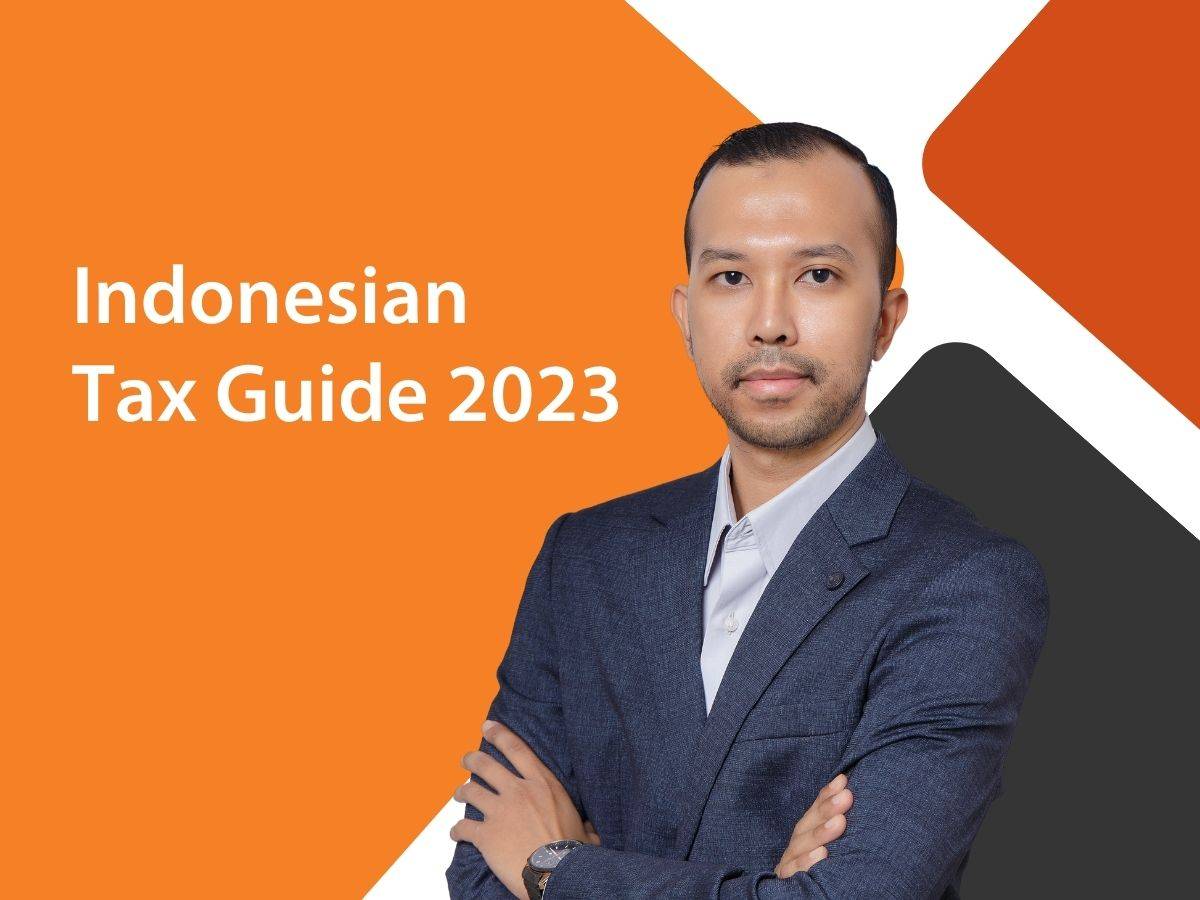Indonesian Corporate Tax Introduction and Guide of Indonesian Income Tax and Value Added Tax 2023
In this publication, KAP Agus Ubaidillah dan Rekan (TGS AU Partners) will only discuss some of the tax obligations for limited liability companies which we consider important in doing business in Indonesia.
Income tax is imposed on income received by corporate taxpayers (companies and other types of legal entities) and individual taxpayers. Income tax is also imposed on income received by foreign taxpayers originating from Indonesia.
In addition to income tax and value added tax, certain business sectors such as the natural resources sector are subject to official government levies such as royalty levies, customs levies, as well as taxes imposed by local governments such as land and building taxes.

The taxation system in Indonesia uses a self-assessment system, so that tax calculation and reporting is carried out by the taxpayer himself and also uses a withholding tax system.
The withholding tax system causes most transactions, other than the sale of goods, some of the income withheld by other taxpayers. The income withheld by other taxpayers becomes a tax credit or becomes a tax payment, depending on the type of income received by the company.
Our Service Recommendations
The tax obligations of a limited liability company and the matters that we discuss in this publication are:
-
Corporate income tax (Corporate Income Tax)
-
Value added tax (for companies that meet certain conditions)
-
Sales tax on luxury goods
-
Article 21 income tax, articles 23/26, article 15, article 4.2 (withholding taxes)
-
Bookkeeping for taxation
Corporate income tax
Income tax for a limited liability company and for a permanent establishment may be subject to several types of income tax, namely normal income tax, final income tax, or a combination of income tax subject to normal rates and final income tax (if the company earns certain income which is subject to final income tax).
Some of the important points of the corporate income tax are:
-
Need to maintain the company's accounting and documents in accordance with applicable accounting standards and tax regulation.
-
Need to ensure the adjustments to deductible costs and also costs related to income that are subject to final tax (ie not allowed to be counted as expenses in tax calculations at normal tax rates)
News & Articles Recommendations.
-
Need to pay attention to the alignment between the amount of tax withheld and reported in SPT PPh 21, 23, 26, 4.2 with the amount of related costs in one year presented in the income statement.
-
Must pay attention to the alignment between the number of sales and purchases that have been reported on the VAT return with the amount on the income statement.
-
Should prepare supporting data if there is a discrepancy between the amounts which may be due to differences in tax treatment due to time or other reasons.
-
Regarding affiliated transactions, ensuring that the transaction price is reasonable and documenting the pricing (transfer pricing documentation).
A simple example so you can understand the concept of income tax in Indonesia
Example 1
PT Think Global Success Product (foreign capital company) runs a manufacturing business. Apart from the manufacturing business, the company also earns other income, namely renting unused space in its factory to other parties. The profit after tax is distributed to the shareholders as a dividend.
| Type of income | Type of income tax |
| Manufacturing business income. | Corporate income tax with normal tax rate is levied on profits from manufacturing operations.
Companies must pay income tax on imports of raw materials. This paid income tax becomes a tax credit against the normal rate income tax payable. |
| Revenue from office space rental | Final income tax is imposed on office space rental. |
| Dividend income received by shareholders | The company must withhold dividend income tax. |
Example 2
PT Think Global Success Products has an income of under 4.8 billion a year, consisting of manufacturing business income and leasing space to third parties.
| Type of income | Type of income tax |
| Manufacturing business income. | Because the total turnover is below 4.8 billion rupiah, the manufacturing business income is subject to final income tax. If above 4.8 billion, the applicable income tax is income tax at the normal rate. |
| Revenue from office space rental | Final income tax is levied on space rental. |
Income tax that is subject to the normal tax rate
The general rate of income tax or also called the normal rate of income tax is imposed on companies that have a turnover of over IDR 4.8 billion a year and for companies that are not subject to final income tax (examples of companies whose income is subject to final income tax include construction service companies and property companies, as well as MSME companies that meet certain criteria, see the final income tax explanation below).
General rate of corporate income tax
The general tax rate for corporate income tax (normal corporate income tax rate) applicable in 2022 is 22% of taxable income in one year. For companies with gross turnover of less than Rp. 50 billion, a tax rate reduction facility of 50% is provided on the taxable income of the share of gross circulation of up to Rp. 4.8 billion.
Corporate taxpayers who are public listed companies (listed in Indonesian Stock Exchange “IDX”) are subject to a reduction in the corporate income tax rate of 3% from the normal tax rate.
Additional tax for Permanent Establishment
Taxable income after being deducted by tax from a permanent establishment in Indonesia is subject to a tax of 20% (twenty percent), unless the income is reinvested in Indonesia, the provisions of which are further regulated by or based on a Regulation of the Minister of Finance.
Deductible expenses
Taxable income for business fields other than those determined by the government is obtained from gross income after deductible expenses in accordance with the provisions of the income tax law.
Expenses that can be deducted from gross income according to the Income Tax Law are as follows:
-
costs directly or indirectly related to business activities, among others:
-
cost of purchasing materials
-
costs related to work or services including wages, salaries, honorarium, bonuses, gratuities, and benefits;
-
interest, rent, and royalties;
-
travel expense;
-
waste treatment costs;
-
insurance premium;
-
promotion and sales expenses;
-
administrative costs; and
-
taxes except Income Tax;
-
depreciation of expenditures to acquire tangible assets and amortization of expenditures to acquire rights and other costs that have a useful life of more than 1 (one) year;
-
contributions to pension funds whose establishment has been approved by the Financial Services Authority;
-
losses due to the sale or transfer of assets owned and used in the company or owned to obtain, collect, and maintain income;
-
foreign currency exchange loss;
-
research and development costs for companies conducted in Indonesia;
-
scholarship, internship, and training costs;
-
receivables that are clearly uncollectible provided that:
-
has been charged as an expense in the commercial income statement;
-
Taxpayers must submit a list of uncollectible receivables to the Directorate General of Taxes; and
-
the collection case has been submitted to the District Court or government agency that handles state receivables; or the existence of a written agreement regarding the write-off of receivables/debt relief between the creditor and the debtor concerned; or has been published in a general or special publication; or there is an acknowledgment from the debtor that his debt has been written off for a certain amount of debt;
-
the conditions referred to in number 3 do not apply to the write-off of small debtors' uncollectible accounts (stipulated by Government Regulation; )
-
donations in the context of national disaster management, the provisions of which are regulated by Government Regulations;
-
donations in the context of research and development conducted in Indonesia, the provisions of which are regulated by Government Regulations;
-
costs of developing social infrastructure, the provisions of which are regulated by Government Regulations;
-
donations of educational facilities, the provisions of which are regulated by Government Regulations;
-
donations in the context of sports development, the provisions of which are regulated by Government Regulations; and
-
reimbursement costs or compensation provided in kind and/or enjoyment.
Specific determination of taxable income for certain business fields
The calculation of taxable income for certain taxpayers is determined by the government using a certain percentage figure determined by the Minister of Finance. Certain taxpayers include:
-
International shipping or airline companies,
-
foreign insurance company,
-
oil, gas and geothermal drilling companies,
-
foreign trading company,
-
companies that make investments in the form of build-operate-transfer ("build, operate, and transfer").
Corporate income tax credit
Corporate income tax credits can be in the form of:
-
Taxes that have been withheld by other parties supported by proof of withholding taxes (income tax credit article 23 or income tax article 4.2)
-
Tax installments paid by the company (referred to as income tax installments article 25)
-
Tax collected by the Director General of Customs and Excise for import transactions (Income tax article 22)
-
Taxes collected by certain taxpayers (including the government, BUMN) for the purchase of certain goods or commodities, including oil and gas (Income tax article 22)
-
Taxes withheld or paid abroad can become tax credits as long as they comply with the provisions of the Indonesian tax law (Income tax article 24)
Final income tax
Final income tax in Indonesia is imposed on certain income and certain types of companies (including certain MSMEs as one of the tax facilities).
Transactions or income subject to final income tax
Transactions or types of income subject to final income tax in Indonesia include:
-
Construction services income
-
Buying and selling shares in the capital market
-
Rent of land and buildings
-
dividend income
-
Interest income received by banks
-
Transactions of buying and selling shares in the capital market in Indonesia
Each of the above incomes is subject to a different final income tax rate according to Indonesian income tax laws.
Final income tax is generally deducted directly by the income provider and is considered paid off when it has been deducted, deposited and reported to the state by the income provider. In other words, the final income tax does not recognize the tax credit mechanism.
Type of company whose income is subject to final income tax
Final income tax on business income is imposed for businesses with certain categories which according to tax are classified as MSME companies, namely turnover below IDR 4.8 billion and can be in the form of limited liability companies or business entities in the form of associations other than services/professionals.
The tax rate charged for final income tax from corporate income is 0.5% of turnover or gross sales. The final income tax is paid monthly according to the amount of sales/gross income each month.
Final income tax has a time limit before it is required to be subject to the normal tax rate, namely: 4 years for corporate taxpayers in the form of cooperatives, limited partnerships (CV or Firma) and 3 years for corporate taxpayers in the form of limited liability companies.
Tax on dividends
Income in the form of dividends received by shareholders is a tax object in Indonesia. If dividends are reinvested in Indonesia, either in the form of share capital or property, the dividends are exempt from income tax. Read more about dividend income tax here
Deadline of corporate income tax filing and payment in Indonesia
Corporate income tax reporting is done by filling through Indonesian the tax office's online tax submission platform, no later than the last date of the fourth month after closing the company's books. For companies with financial year January to December, the last date for payment of corporate income tax payable and reporting the Corporate Income Tax Return is April 30 of the following year.
Companies using a financial year other than January - December are required to submit an application to the tax office before using a different accounting year.
The corporate income tax report contains the following:
-
Taxpayer profile data, including the type of taxpayer's business
-
List of shareholders
-
Calculation of gross turnover, costs, taxable income, tax credits and taxes payable
-
List of fiscal adjustments to income and expenses
-
List of income subject to final tax
-
Information of financial statements (audited financial statements will be requested by the tax office if the company is included in the criteria for companies that are required to have their financial statements audited)
-
Cost of revenue breakdown information
-
Business cost breakdown information
-
Information about affiliated transactions and determination of transfer pricing (under certain conditions, documentation of affiliated transactions or transfer pricing, we call it TP Documentation, is required as part of the tax return)
The company is required to pay the tax payable in full amount prior to file corporate income tax.
Treatment of losses in taxation
If the company suffers a loss (fiscally) then the loss can be compensated against taxable income for a period of five years (fiscal loss carry forward).
Transfer pricing
For transfer pricing, the Director General of Taxes under the Minister of Finance is given the authority to determine a fair price for transfer pricing transactions carried out by taxpayers (Income Tax Law Article 18 paragraph 3). Thus, if a transaction occurs between related parties, the transaction requires special attention and preparation because the tax obligations for transfer pricing transactions are different from ordinary transactions.
Taxpayers with affiliated transactions who meet certain criteria are required to prepare transfer pricing documentation including master files, local files and country-by-country reports. An explanation of the tax provisions for transfer pricing transactions can be accessed through this link.
Value-added tax
Value added tax is a tax imposed on the delivery of taxable goods or services, including:
-
Delivery of the Taxable Goods in the Customs Area by entrepreneurs;
-
Import of Taxable Goods;
-
Delivery of Taxable Services within the Customs Area carried out by entrepreneurs;
-
Utilization of Intangible Taxable Goods from outside the Customs Area within the Customs Area;
-
Utilization of Taxable Services from outside the Customs Area within the Customs Area;
-
Export of Tangible Taxable Goods by Taxable Entrepreneurs;
-
Export of Intangible Taxable Goods by Taxable Entrepreneurs; and
-
Export of Taxable Services by Taxable Entrepreneurs.
Customs area is the territory of the Republic of Indonesia which includes the land area, waters and airspace above it, as well as certain places in the Exclusive Economic Zone and the continental shelf in which the law governing customs applies.
It is important to understand that VAT is a type of tax that is subject to higher fines than other types of taxes. Thus, companies must be careful in administering VAT.
Value-added tax rates
The value-added tax rate for most types of taxable transactions since 2022 is 11%, while for the delivery of taxable goods or services abroad (exports) it is 0%.
Who should charge value-added tax (VAT)?
Not all companies are required to charge value added tax (VAT). VAT is only required to be imposed by Taxable Entrepreneurs who belong to the category of companies or entrepreneurs with a gross turnover of over IDR 4.8 billion.
Types of taxable goods and services
Value added tax regulations use a negative list of goods or services that are exempted from the imposition of VAT. For the delivery of goods and services other than those stated in the Law on Harmonization of Tax Regulations (the most recent amendment per 2022 of several tax laws, one of which is the VAT Law), transactions made by taxpayers must be subject to VAT.
There are VAT facilities for several types of goods and services, including health services that are part of the national health insurance program, financial services, basic goods that are needed by the people at large, education services, public transportation services, labor services, financial services, insurance services.
The VAT facility provided is that the tax payable is not collected in part or in whole or is exempt from taxation, either temporarily or permanently.
Even though such VAT facilities are provided, the administration of tax reporting remains required to taxpayers.
Goods and services that are not subject to value added tax (according to the Law on Harmonization of Tax Regulations article 4A)
The following goods and services are not subject to value added tax:
Types of goods that are not subject to Value Added Tax are certain goods in the group of goods as follows:
Food and drinks served in hotels, restaurants, restaurants, stalls, and the like, include food and drinks whether consumed on site or not, including food and drinks delivered by catering or catering businesses, which are objects of local taxes and levies area in accordance with statutory regulations in the field of regional taxes and regional levies; and Money, gold bullion for the benefit of the state's foreign exchange reserves, and securities.
Types of services that are not subject to Value Added Tax are certain services in the service group as follows:
-
Religious services;
-
Art and entertainment services, including all types of services performed by arts and entertainment workers which are objects of regional taxes and regional fees in accordance with the provisions of laws and regulations in the area of regional taxes and fees;
-
Hospitality services, including room rental services and/or room rental services in hotels which are objects of regional taxes and regional levies in accordance with the provisions of laws and regulations in the field of regional taxes and levies;
-
Services provided by the government in the context of running the government in general, include all types of services in connection with service activities that can only be carried out by the government according to its authority based on laws and regulations and these services cannot be provided by other forms of business;
-
Parking space provision services, including parking space provision or management services carried out by parking lot owners or parking lot management entrepreneurs to parking lot users who are objects of regional taxes and regional levies in accordance with the provisions of laws and regulations in the field of regional taxes and levies;
-
Catering or catering services, include all food and beverage provision service activities which are objects of regional taxes and regional levies in accordance with the provisions of laws and regulations in the field of regional taxes and levies.
Criteria for companies that are required to register as taxable entrepreneur
Taxpayers who meet the criteria of a taxable entrepreneur must register to be confirmed as a taxable entrepreneur. The imposition of VAT on sales transactions must be accompanied by a document called a tax invoice (shall be issued by a taxable entrepreneur/enterprise).
The pros and cons of being a taxable entrepreneur
Pros
-
Companies that have become taxable entrepreneurs can credit value added tax from purchase transactions.
-
In some project tenders, especially in government projects, tender participants are often required to be companies that are already taxable entrepreneurs.
Cons
-
Companies must apply or charge value added tax so that the selling price is higher than the other companies that do not charge value added tax.
-
Administration of tax invoices and reporting of tax return of VAT which must be done timely and every month.
Tax Invoice
The company must issue a tax invoice according to the time specified by the tax regulations, whichever comes first, between when the money is received from the buyer or when the goods or services are delivered to the buyer. Administration of tax invoices must comply with Indonesian tax regulations, including those issued using e-faktur and also the number of tax invoices must be obtained by applying online to the tax office.
Mechanism of Value Added Tax in Indonesia
The mechanism of VAT is that the taxpayer must pay the difference if the VAT OUT (VAT imposed by the taxpayer) collected from the buyer is greater than the credited VAT IN (VAT paid by the taxpayer in spending to third parties and transactions of imported goods/services with transaction terms and tax invoices are eligible for credit).
If VAT IN is greater than VAT OUT, the amount becomes a tax credit that can be compensated for VAT OUT in the following months. In addition, the VAT IN tax balance can be requested for refund on condition that a tax audit is carried out.
In general, a taxpayer who has become a taxable entrepreneur is the party that collects VAT, but if the taxpayer deals with certain taxpayers who are classified as tax collectors (including government agencies, state owned enterprises, government and private partnership entities), the tax collector collects the VAT so that the amount received by the company does not include VAT, because the VAT is directly paid by the tax collector.
Not all VAT can be credited (reducing outstanding value-added tax), only VAT IN from the transactions related to the business and purchase tax invoices are eligible. It is important for the company to ensure that the tax invoice it obtains from the seller has met the tax conditions before it is credited.
Deadline of payment and VAT return submission in Indonesia
VAT must be paid no later than the end of the following month after the end of the Tax Period and before the periodic tax return of Value Added Tax is submitted. Value Added Tax Return shall be submitted no later than the end of the following month after the end of the tax period.
Sales Tax on Luxury Goods in Indonesia
Sales Tax on Luxury Goods in Indonesia is imposed on:
-
Delivery of taxable goods that are classified as luxury carried out by entrepreneurs who produce these goods within the Customs Area in their business activities or work; and
-
Import of Taxable Goods that are classified as luxury.
Sales Tax on Luxury Goods is imposed only 1 (one) time at the time of delivery of Taxable Goods that are classified as luxury by the entrepreneur who produces or at the time of import of Taxable Goods that are classified as luxury.
Categories of Taxable Goods that are Classified as Luxury
Taxable Goods that are classified as luxury are:
-
Goods that are not basic necessities;
-
Goods consumed by a particular society;
-
Goods that are generally consumed by high-income people; and/or
-
Consumed goods to indicate status
Provisions regarding the group of Taxable Goods classified as luxury which are subject to Sales Tax on Luxury Goods other than export sales are regulated in the Government Regulation of the Republic of Indonesia.
Provisions regarding the types of goods subject to Sales Tax on Luxury Goods for export sales are regulated in the Regulation of the Minister of Finance of the Republic of Indonesia.
Who is Obliged to Impose Sales Tax on Luxury Goods on Imports
The imposition of Sales Tax on Luxury Goods on the import of Taxable Goods that are classified as luxury does not take attention to:
-
who imports the Taxable Goods, and
-
whether the import is carried out continuously or only once.
In addition, the imposition of Sales Tax on Luxury Goods on a delivery of Taxable Goods that is classified as luxury does not take attention to whether:
-
a part of the Taxable Goods has been subject to or
-
not subject to Sales Tax on Luxury Goods in the previous transaction.
Value added tax rates
The sales tax rates on luxury goods in Indonesia according to the law are as follows:
-
The Sales Tax rate on Luxury Goods is set at the lowest 10% (ten percent) and the highest 200% (two hundred percent), or
-
Exports of Taxable Goods that are classified as luxury are set at a rate of 0% (zero percent).
How to Calculate Sales Tax on Luxury Goods in Indonesia
Sales Tax on Luxury Goods owed is calculated by taxpayers in Indonesia by multiplying the tax rate and the taxable base.
Crediting of Sales Tax on Luxury Goods that has been Paid at the Time of Acquisition or Import
Sales Tax on Luxury Goods that has been paid at the time of acquisition or import of Taxable Goods Classified as Luxury, cannot be credited with Value Added Tax or Sales Tax on Luxury Goods collected under the Law.
Refund of Sales Tax on Luxury Goods that has been Paid at the Time of Acquisition
Taxable Entrepreneurs who export Taxable Goods That Are Classified as Luxury can apply for refund for Sales Tax on Luxury Goods that have been paid at the time of acquisition of the exported Luxury Taxable Goods.
Income tax for payment to employee and to other parties - Income Tax Article 21, Article 23/26, Article 15, Article 4.2 (Withholding Taxes) in Indonesia
Companies as a corporate taxpayers in Indonesia are obliged to withhold, pay and filing income tax return regarding the income paid to other parties in the country and abroad (unless regulated differently in the tax treaty) including:
-
Salary, honorarium, bonus and other kind of rewards received by employees and other private persons working for the company which related to services, work and activities
-
Professional service fee and rewards
-
Land leases, buildings including office space, and other leases
-
Software royalty fees
-
Loan interest
-
Dividend
-
Prizes and awards
-
Pensions and other periodic payments;
-
Swap premiums and other hedging transactions; and/or
-
Profits due to debt relief.
If the recipient of income is an individual domestic taxpayer, the type of income tax withheld is income tax article 21. if the recipient is an individual foreign taxpayer, the type of income tax is income tax article 26.
If the recipient of income is a domestic taxpayer and business entity, the type of income tax withheld could be:
-
Income tax article 4 paragraph 2 (for income subject to final tax, including construction services, dividends), or
-
Income tax article 23 (for income from services, interest, rent other than land and buildings) while if the recipient is a foreign taxpayer business entity, the type of income tax is article 26 income tax.
The consequence for companies that do not withhold income tax is that it remains a tax payable for the company.
Withholding Tax Slip in Indonesia
Companies that withhold income tax from other taxpayers are required to provide withholding tax slips to the taxpayer whose income has been withheld.
Income Tax Rate Article 21
Again, income tax article 21 is withholding tax for payment to Indonesian taxpayers, that can be employees or individuals that provide service to the company.
The income tax rate of article 21 depends on the amount of income received by the employee or service provider.
In general, the article 21 income tax that must be withheld from the recipient of income use individual income tax rate for annualized taxable income, as follows:
Taxable income and income tax rates (from taxable income) for Individual
- Up to 60 million Rupiah, the tax rate is 5%
- Above 60 million Rupiah up to 250 million Rupiah, the tax rate is 15%
- Above Rp 250 million up to Rp 500 million, the tax rate is 25%
- Above Rp 500 million up to Rp 5 billion, the tax rate is 30%
- Above Rp 5 billion, the tax rate is 35%
Please note that there are special provisions for discount rates, increased tax rates and also different calculation methods for various situations or conditions of employment.
Income Tax Rate Article 23
Again, income tax article 23 is withholding tax for payment of Indonesian taxpayers, that is not individuals which is a business entity.
Article 23 income tax rates are as follows:
a. 15% (fifteen percent) of the gross amount for:
-
Dividends
-
Interest
-
Royalties; and
-
Prizes, awards, bonuses, and the like other than those already deducted by Income Tax
b. 2% (two percent) of the gross amount of:
-
Rent and other income associated with the use of assets, except for rent and other income in connection with the use of assets that have been subject to Final Income Tax.
-
Compensation associated with technical services, management services, construction services, consulting services, and other services other than services that have been deducted by Income Tax as referred to in Income Tax Article 21.
Income Tax Rate Article 26
Based on the list below, companies withhold tax of 20% to foreign taxpayers other than permanent establishments in Indonesia. The objects of income withheld by income tax article 26 are:
-
Dividend;
-
Interest includes premiums, discounts, and rewards in connection with the guarantee of debt repayment;
-
Royalties, rent and other income associated with the use of property;
-
Rewards associated with services, work, and activities;
-
Prizes and awards;
-
Pensions and other periodic payments;
-
Swap premiums and other hedging transactions; and/or
-
Profits due to debt relief.
Increase in Withheld Tax Rate for Income Earners Who Do Not Have an NPWP (Tax Identification Number) in Indonesia
If the recipient of the income does not have an NPWP (Tax Identification Number), the tax rate for withholding tax is increased as follows:
-
Income tax article 21: increase in the tax rate of 20% from the applicable tax rate
-
Income tax article 23: increase in the tax rate to 100% of the applicable tax rate
Tax Filing and Tax Payment in Indonesia
Tax Return Filing in Indonesia
Every Taxpayer is required to fill out a Tax Return in Indonesian language using Latin letters, Arabic numerals, Rupiah currency units, and sign and submit it to the office of the Directorate General of Taxes where the Taxpayer is registered or confirmed.
The tax return filing or tax return submission can be done online.
Taxpayers who have obtained permission from the Minister of Finance to carry out bookkeeping using foreign language and currencies other than Rupiah, they must submit Tax Returns in Bahasa Indonesia and permitted currencies other than Rupiah.
Deadline for Submission of Tax Returns in Indonesia
Deadline for submission of tax return are as follows:
-
Monthly tax return article 21, 23/26, and article 4 paragraph 2 no later than 20 (twenty) days after the end of the Tax Period;
-
Monthly tax return VAT no later than the last date of the month after the end of the Tax Period;
-
Annual tax return for individual income tax, no later than 3 (three) months after the end of the Tax Year.
-
Annual tax return for corporate income tax, no later than 4 (four) months after the end of the Tax Year.
Deadline of tax payment are as follows:
-
Monthly tax return article 21, 23/26, and article 4 paragraph 2 no later than 20 (twenty) 10 days after the end of the Tax Period;
-
Monthly tax return VAT no later than the last date of the month after the end of the Tax Period;
-
Annual tax return for individual income tax, no later than 3 (three) months after the end of the Tax Year.
-
Annual tax return for corporate income tax, no later than 4 (four) months after the end of the Tax Year.
Bookkeeping for Taxation in Indonesia
Limited liability companies in Indonesia as corporate taxpayers are required by the Law of General Provision of Taxation to maintain bookkeeping. The bookkeeping must be kept in good faith and reflect the actual condition or business activity.
The financial statements required by tax regulations in Indonesia are balance sheet and profit and loss, but under the Law on limited liability companies the financial statements are not only balance sheet and profit and loss, but also include a statement of cash flows, a statement of changes in equity, and notes to financial statements.
In our experience, the tax office can request audited financial statements if the company is classified as a company that must be audited in accordance with laws and regulations. According to the Law of Limited Liability Companies and the Minister of Trade Regulation, entities required to audit its financial statements include:
-
companies with sales or assets of more than 50 billion
-
companies managing funds from the public
-
Public listed companies
-
foreign-owned companies
-
agents and representatives of foreign companies.
Bookkeeping must be held in Indonesia using Latin letters, units of Rupiah currency, and prepared in Indonesian or in a foreign language permitted by the Minister of Finance. Bookkeeping using foreign languages and currencies other than Rupiah can be carried out by taxpayers after obtaining permission from the Minister of Finance.
Companies can choose cash basis or accrual basis accounting policies and must be consistent in applying accounting policies. However, according to the Limited Liability Companies Law, financial statements must be prepared in accordance with the applicable financial accounting standards in Indonesia, where it does not adopt cash basis accounting.
The financial accounting standards that apply in Indonesia starting in 2023 consist of 4 pillars, including:
-
International Financial Accounting Standards (direct translation from IFRS to Indonesian)
-
Indonesian Financial Accounting Standards (adoption of IFRS with adjustments according to Indonesian conditions
-
Financial Accounting Standards of Entities Without Public Accountability (for companies that have no obligations to the public), will be replaced by SAK Private Entities (in 2025)
-
Financial Accounting Standards of Micro, Small and Medium Entities
Companies that have significant public accountability are required to apply pillar 1 or pillar 2 (International Financial Accounting Standards or Indonesia Financial Accounting Standards) while others are allowed to use pillar 3 or pillar 4.
The financial year is January to December. Changes to the bookkeeping method and or accounting year must obtain approval from the Director General of Taxes.
Books, records, transaction documents must be kept for 10 (ten) years in Indonesia, at the domicile of corporate taxpayers.
Tax Facilities in Indonesia
The Indonesian government provides tax facilities in Indonesia for Indonesian limited liability companies including:
-
Companies in certain pioneer business fields with a minimum investment starting from 500 billion rupiah
-
Companies in strategic business fields and certain areas with investments starting from 100 billion rupiah
-
Companies in special economic zones with investments starting from 100 billion rupiah
-
Companies that invest in labor-intensive industries
-
Companies conducting research and development in Indonesia
-
Companies that provide work practices, internships, and learning for the development of human resources based on certain competencies.
News & Articles Recommendations.





